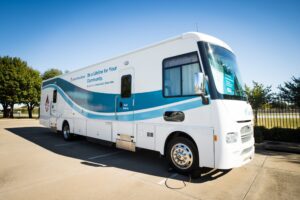A selfless act with a significant impact
- April 11, 2024
- By: Libby Maness
- Community

In the United States alone, a patient receives a blood transfusion every two seconds. The average transfusion patient receives 2.5 units of blood — approximately 200 milliliters of red blood cells.
Every three minutes, someone is diagnosed with a blood cancer, like lymphoma or leukemia, that requires a stem cell or bone marrow transplant. Among those patients, only 30% can find a donor match in their family. The rest of the patients rely on a stranger.
Whether it’s blood, stem cells or bone marrow, the need for donors has never been greater.
Blood donations are critical for people battling cancer, undergoing surgeries and facing other medical emergencies. A single donation can save up to three lives.
“A stable blood supply is essential to meet the needs of our patients,” said Colleen Horan, field recruitment consultant at Carter BloodCare. “More than a quarter of all donated blood goes to cancer patients, but there are many others who rely on these transfusions.”
Among those others include patients who have experienced trauma, are undergoing open-heart surgery, having organ transplants, going through childbirth complications, or patients with sickle cell and other blood disorders, Horan explained.
Blood donations aren’t the only way you can save a patient’s life. Signing up to be a stem cell and bone marrow donor can give a second chance at life to the 70% of transplant patients who don’t match with a family member.
“Donating to a patient is quite simple,” said Raegan Bell, donor recruitment coordinator for DKMS, an international nonprofit organization dedicated to the fight against blood cancer and blood disorders. “A donation, whether it’s stem cells or bone marrow, will save a life.”
Some patients wait years for a bone marrow or stem cell donor. These donations replace a patient’s diseased bone marrow, allowing their body to produce healthy blood cells once again. Sometimes, by the time they find a donor, it’s too late, Bell explained.
“Many years ago, I matched with a patient who needed a bone marrow transplant,” Bell said. “That individual is currently living a healthy, cancer-free life because of my donation.
“I was blown away by the entire process and made it my mission to tell as many people as possible how easy it is to be a donor. I think if they knew, we’d have more donors and we’d save more lives.”
A lifesaving partnership
For more than three decades, HSC has been partnering with Carter BloodCare. The university hosts five blood drives annually, collecting an average of 25 pints of blood at each event. This dedication has resulted in a remarkable contribution of more than 6,136 pints of blood since 1991 – a testament to HSC’s commitment to its mission to “create solutions for a healthier community.”
The impact extends beyond blood donations. HSC’s nine-year collaboration with DKMS has significantly expanded the pool of potential lifesavers. By adding 73 people to the donor database, HSC has created a way for critically ill patients to find a potentially life-saving match.
“Working with HSC for so many years has been amazing,” Horan said. “This partnership has allowed us to keep saving lives, one blood drive at a time.”
Becoming a donor
Registering to become a stem cell and bone marrow donor with DKMS is an easy, three-step process.
- Order a swab kit online
- Swab your cheek
- Return to DKMS
You’re a match, what’s next?
If you’re a match for a patient in the database, DKMS will contact you to start the donation process. Once the organization contacts you, staff members will help walk you through a health questionnaire and a blood test to ensure you’re the best possible match. It’s during this time that staff will determine if they should collect your peripheral blood stem cell or bone marrow donation.
After the collection is complete, the recipient will receive the donation and their second chance at life.
“To me, it’s so simple,” Bell said. “Why would you not jump at the chance to save someone’s life?”
If you or someone you know are interested in becoming a stem cell or bone marrow donor, please visit: www.dkms.org/register-now. You can also visit the MET lobby during the next blood drive to register in person.
For more information on the urgent need for local blood donors and ways to help, visit CarterBloodCare.org.





Social media